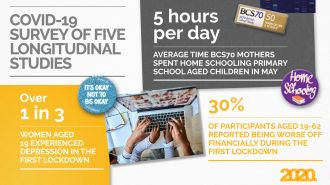- Our studies
- Our research
- Publications and resources
- Data access and training
- About
- News
- Events
- Get in touch
- Join our mailing list
Welcome to our news and blogs section. Here you’ll find the latest developments and insights from across our longitudinal studies.

Tens of thousands of secondary school pupils across England will be invited to take part this week in COSMO – the largest study of its kind into the effects of COVID-19 on a generation of young people.

Researchers from around the world have been using CLS study data to tackle important questions. Here is a round-up of nearly 100 new pieces of research that we’ve added to the CLS bibliography between April and June 2021.

More than one in three British adults are suffering from two or more chronic health conditions in middle age, such as recurrent back problems, mental ill-health, high blood pressure, diabetes, and high-risk drinking, according to UCL researchers.

At age 17, 9% of males have carried or used a weapon, with one in four of those involved in this form of serious offending reporting they are gang members, according to UCL researchers.

Researchers can now access new information about how the COVID-19 pandemic impacted the lives of almost 28,000 cohort study participants during the third national lockdown in February and March.

Researchers from around the world have been using CLS study data to tackle important questions. Here is a round-up of over 70 new pieces of research that we’ve added to the CLS bibliography between January and March 2021.

The Centre for Longitudinal Studies (CLS) is to launch a new UK-wide study that will test approaches to setting up a full large-scale national birth cohort study in the future. The study team is calling for input from future data users as it develops its plans for the two-year feasibility study.

The Centre for Longitudinal Studies (CLS) is part of the team behind a new cohort study of current Year 11 students, which will investigate the educational and employment inequalities brought about by the COVID-19 crisis.

Substance use and antisocial behaviour are more likely to go hand-in-hand with poor mental health for generation Z teens compared to millennial adolescents growing up a decade earlier, finds a new UCL study.

From this summer, we hope to start catching up with our BCS70 participants to see how they’re faring in their early 50s.

As the pandemic has unfolded we have surveyed participants of five national longitudinal studies, including the 1970 British Cohort Study (BCS70) to track the effects of COVID-19 over time. Here’s a summary of our researchers’ initial findings.

Researchers from around the world have been using CLS study data to tackle important questions. Here is a round-up over 40 new pieces of research that we’ve added to the CLS bibliography between October and December 2020.
Ryan Bradshaw
Senior Communications Officer
Phone: 020 7612 6516
Email: r.bradshaw@ucl.ac.uk